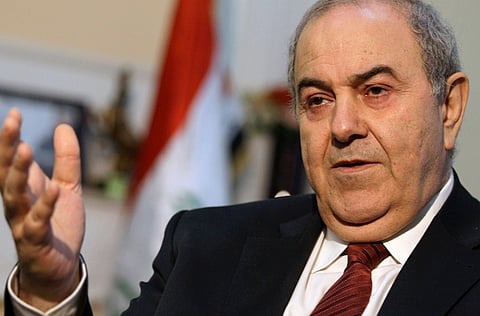Everything points to Allawi
Leader of Al Iraqiya bloc has also won support of Supreme Islamic Iraqi Council

The magical number in Iraq today is 163. It is magical because it represents the half-plus-one majority of parliamentary seats required for any political coalition in Iraq to name a prime minister, according to the country's Constitution.
The Al Iraqiya bloc headed by Dr Eyad Allawi won 91 seats, which means it cannot single-handedly form a government. But before seeking to answer the question of who might align themselves with Allawi, it is worth pointing out that the Al Iraqiya leader has some traits that make doing so a good idea.
It was in Amman in mid-2006 that Gulf News met the former prime minister for an interview. He struck a very important note then by saying: "We have never regarded Iraq from a sectarian Sunni, Shiite, Muslim, Christian, Arab, Kurdish, Turkmen or other point of view." He added that Iraq is being re-established according to sectarian quotas, and divisions are emerging even within sects.
Commenting on Nouri Al Maliki's assertion that he wanted to achieve regime change by force, he said, "Where is the force and weapons I am supposed to use? This is irrational." Instead, Allawi's strength stems from his belief in a non-sectarian, united Iraq.
The Al Iraqiya bloc leader has astutely announced his intention of visiting Iran and other neighbouring countries to discuss the formation of the new Iraqi government. This was a peace offering to alleviate Iran's apprehensions towards him and his bloc, which has been accused by many of Al Maliki's followers of being pro-Baathist, an accusation that also worries many Iraqis.
That is why it did not come as a big surprise when Ammar Al Hakim, head of the Supreme Islamic Iraqi Council (ISCI), said a few days ago that his party, which has strong ties to Iran, was open to forming an alliance with Allawi's non-sectarian Iraqiya.
Al Hakim also said that his party, which won more than 30 seats, would not join any Iraqi government that excluded Allawi. This could boost the chances of the election winner becoming Iraq's next prime minister.
A staunch anti-Baathist figure, Al Hakim also cleared up some of the misconceptions surrounding Allawi when he said, "I can't vouch for all the winning candidates of Al Iraqiya, but I can confirm that Al Iraqiya as a slate is not pro-Baathist".
Practically speaking, backing from the ISCI leaves Allawi 41 seats short of becoming prime minister.
Looking again at the election results, another group has come to the fore: Moqtada Al Sadr's Sadrists. Having won more than 39 parliamentary seats, Al Sadr has emerged as a kingmaker.
Al Sadr backed Al Maliki four years ago in Iraq's 2006 elections and helped to win him the premiership. But much to Al Sadr's surprise, as he likes to tell his followers, Al Maliki returned the favour by leading a law enforcement campaign against him. Bearing this bitter experience in mind, Al Sadr has asked his followers to choose a prime minister from a list of candidates. This obviously works to Allawi's advantage.
Patrick Cockburn, a Middle East correspondent, wrote in a recent article for The Independent, "Much criticised by his own followers for not resisting the Iraqi army more forcibly in 2008, Mr Sadr appears to have realised that Iraqis were fed up with ill-disciplined militiamen ruling the streets. He has also been careful since the battles for Najaf in 2004 to avoid a direct confrontation with American forces, though he continually demands their withdrawal."
Al Sadr has not forgotten his grudge against Al Maliki, whom his followers regard as being worse than Saddam Hussain. He has listed five candidates for the post of prime minister: Allawi, Al Maliki, Jaafar Mohammad Baqir Al Sadr, Adil Abdul Mahdi and Ebrahim Jaafari.
If Al Hakim had not spoken out in support of Allawi a few days ago, the most probable choice would have been Jaafar Mohammad Baqir Al Sadr (Moqtada Al Sadr's cousin and son of Ayatollah Mohammad Sadiq Al Sadr, the founder of the Al Dawa Party).
However, the Shiite coalition, which is made up primarily of the ISCI and the Sadrists, is backed by Iran, which now regards Allawi in a favourable light.
Hence, the chances are that Allawi will become prime minister. If this comes to pass, he will likely bring Iraq back into the Arab fold, reassert the country's position in the Arab world and no doubt face severe challenges from Iran, a neighbour that considers Iraq its backyard.
Sign up for the Daily Briefing
Get the latest news and updates straight to your inbox


